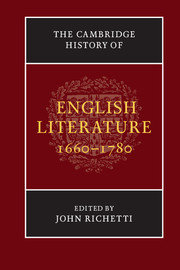Book contents
- Frontmatter
- Introduction
- PART I LITERARY PRODUCTION AND DISSEMINATION: CHANGING AUDIENCES AND EMERGING MEDIA
- PART II LITERARY GENRES: ADAPTATION AND REFORMATION
- PART III LITERATURE AND INTELLECTUAL LIFE: THE PRODUCTION AND TRANSMISSION OF CULTURE
- 14 History and literature 1660–1780
- 15 A preliminary discourse on philosophy and literature
- 16 Britain and European literature and thought
- 17 Religion and literature
- 18 Literary criticism and the rise of national literary history
- 19 Augustan England and British America
- PART IV LITERATURE AND SOCIAL AND INSTITUTIONAL CHANGE
- PART V LITERARY GENRES: TRANSFORMATION AND NEW FORMS OF EXPRESSIVENESS
- PART VI CONCLUSION
- Chronology
- Bibliographies
- Index
- References
18 - Literary criticism and the rise of national literary history
from PART III - LITERATURE AND INTELLECTUAL LIFE: THE PRODUCTION AND TRANSMISSION OF CULTURE
Published online by Cambridge University Press: 28 March 2008
- Frontmatter
- Introduction
- PART I LITERARY PRODUCTION AND DISSEMINATION: CHANGING AUDIENCES AND EMERGING MEDIA
- PART II LITERARY GENRES: ADAPTATION AND REFORMATION
- PART III LITERATURE AND INTELLECTUAL LIFE: THE PRODUCTION AND TRANSMISSION OF CULTURE
- 14 History and literature 1660–1780
- 15 A preliminary discourse on philosophy and literature
- 16 Britain and European literature and thought
- 17 Religion and literature
- 18 Literary criticism and the rise of national literary history
- 19 Augustan England and British America
- PART IV LITERATURE AND SOCIAL AND INSTITUTIONAL CHANGE
- PART V LITERARY GENRES: TRANSFORMATION AND NEW FORMS OF EXPRESSIVENESS
- PART VI CONCLUSION
- Chronology
- Bibliographies
- Index
- References
Summary
One story that eighteenth-century critics liked to tell about themselves was the triumph of criticism itself, its rise and progress from modest beginnings before the Restoration to a respected place in English literature. ‘Dryden may be properly considered as the father of English criticism, as the writer who first taught us to determine upon principles the merit of composition’, Samuel Johnson wrote in his Prefaces, Biographical and Critical, to the Works of the English Poets (1779–81). Earlier poets like Shakespeare ‘wrote without rules’, and a few hints had been given by Jonson and Cowley, ‘but Dryden's Essay on Dramatick Poetry [1668] was the first regular and valuable treatise on the art of writing’. Since that time, Johnson continues, sound critical principles had become ‘universally practised’; even the common reader was now a good critic.
The success story of criticism is exemplified by Johnson's own Prefaces. Commissioned to enhance a massive collection of English poetry from Cowley to Gray, they were soon printed separately as Johnson's Lives of the English Poets, which went through many editions. Readers valued the critical effort to sort and judge the poets who represented the nation, and the pleasures of poetry seemed incomplete without the pleasures of talking about it. Johnson's stature as a leading authority on language and literature as well as the conduct of life contributed to the keen public interest in his opinions. But the habit of supplying works with critical prefaces had been ingrained in English since the time of Dryden, who constantly formulated principles to justify what he published. Without such a preface, a new text might look naked.
- Type
- Chapter
- Information
- The Cambridge History of English Literature, 1660–1780 , pp. 471 - 497Publisher: Cambridge University PressPrint publication year: 2005
References
- 6
- Cited by



